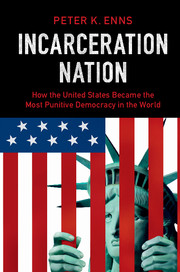3 - Who led whom?
Published online by Cambridge University Press: 05 March 2016
Summary
Public opinion was well ahead of political opinion in calling attention to the rising problem of crime.
James Q.Wilson (1975, p. xvi)Public opinion matters. At least that is the central argument of this book. Many scholars, however, have argued that on the issue of criminal justice, the public has followed, not led, politicians. The argument that politicians have led the mass public offers a potential challenge to this book's thesis. After all, if public opinion simply follows political elites, we cannot think of the public as influencing criminal justice outcomes. Thus, this chapter examines the onset of tough-on-crime political rhetoric and whether this rhetoric typically followed or led public opinion. This chapter proceeds as follows. First, I explain why we might expect political elites to follow the public's preferences. I then use survey data, campaign speeches, and archival memos to evaluate these claims. The analysis pays special attention to Barry Goldwater and Richard Nixon, two of the politicians most associated with the onset of tough-on-crime rhetoric.
Before proceeding, I should clarify how I use the terms political elites and politicians. The term political elites can refer to a broad group that includes politicians as well as others in government who are not elected (such as cabinet appointees and judical appointees) and those directly connected to politicians and government (such as campaign advisers). Throughout this chapter, however, I use political elites and politicians interchangeably. I use this more narrow conception of political elite because the visibility of politicians — especially politicians of national prominence — means they are best positioned to influence public opinion. Thus, the discussion of political elites primarily focuses on presidents and presidential candidates in order to consider the political elites most likely to influence the public. The media represent another important source of elite information. Although media convey political information, because they are outside of the political system, I do not consider media as “political” elites. I explore the relationship between media and punitive attitudes in Chapter 4.
POLITICAL AND PUBLIC CONCERN FOR CRIME
To some extent, the public and politicians influence each other. For example, public opinion may influence what politicians say or the policies they enact. However, these political speeches and policies, which were designed to reflect public opinion, may, in turn, influence the public.
- Type
- Chapter
- Information
- Incarceration NationHow the United States Became the Most Punitive Democracy in the World, pp. 49 - 73Publisher: Cambridge University PressPrint publication year: 2016

